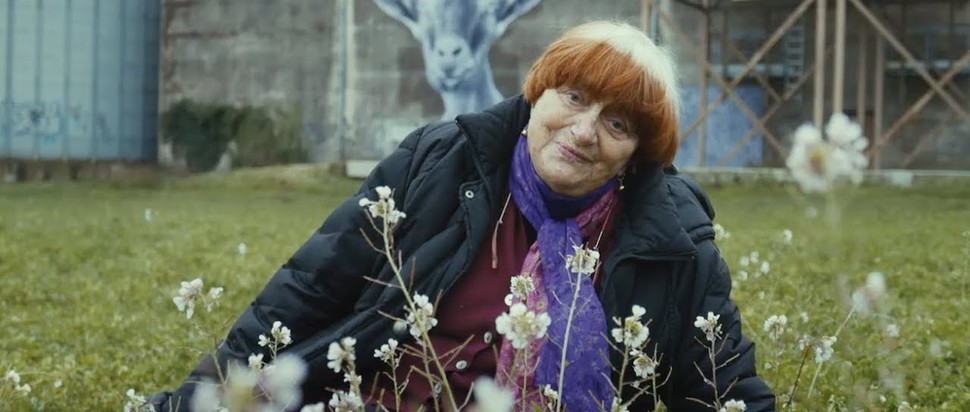Agnès Varda's curious mind will be deeply missed
The great French director Agnès Varda has passed away at the age of 90. Her long career was full of surprise, and brilliant from the off (and she probably kick-started the French New Wave)
French filmmaker Agnès Varda stood barely five feet tall, but in cinema terms, she was a giant. Her work spread over seven decades and never stayed still. The films are equal parts probing and playful, blending realism with poetry, psychological turmoil with humanism.
What I loved most about Varda, though, was her curiosity. Whether she was working in fiction or documentary, you had the impression she could make a film about any subject as long as it excited her, and her passions were myriad and her enthusiasm boundless. She’s made ripped from the headlines films on the civil rights movement in America (Black Panthers) and the women’s rights movement in France (One Sings, the Other Doesn't). She's made films about the people closest to her: her husband, Jacques Demy (Jacquot de Nantes), and her best friend, Jane Birkin (Jane B. par Agnes V). The latter starred alongside Varda’s 14 year-old-son (Mathieu Demy) in comedy-drama Kung Fu Master!, the story of a love affair between a 40-year-old woman and a teen boy. In the splendid Daguerréotypes, Varda simply stuck her head outside the front door of her ground floor flat on the Rue Daguerré to make an affectionate and brilliant portrait of the local shopkeepers on her street.
In her very best films, Varda had the ability to take potentially grim subject matter and dust them with lyricism and hope. In Cleo from 5 to 7, we spend two hours with a French pop singer as she waits to hear the results of a test confirming if her cancer is terminal. That sounds depressing, but the film is so vivaciously shot and edited, and so brimming with the joy of being alive in the moment, that facing one’s mortality has never been more hopeful. In Le Bonheur, meanwhile, Varda gave us one of the most beautiful and ambiguous films ever made about adultery.
She was a rebel with a punk spirit (see her signature two-tone bowl haircut), and tended to be drawn to characters who were similarly contrarian. Her achingly sad road movie Vagabond followed a young woman aimlessly hitchhiking across France, while her delightful documentary The Gleaners and I saw Varda take to the French countryside with a digital camera to meet communities of people who spend their time scavenging for food. In her later years, this brand of witty, scrappy cine-essay became her specialty, and increasingly she was her own subject, like in the wry The Beaches of Agnès and Faces Places, her celebration of ordinary rural people that also acknowledged her failing health.
The latter documentary, co-directed with hipster photographer JR, was wildly popular and seemed to find Varda a whole new generation of fans. Her name wasn’t one of the first to be emblazoned on white Ts by feminist t-shirt company Girls on Tops – younger directors like Sally Potter, Greta Gerwig and Andrea Arnold received that honour – but they soon caught on to her popularity among millennials and her shirt started flying off the shelves.
Her increasing popularity also saw a major retrospective of her work in various cinemas across the UK last year. The series included La Pointe Courte, her intoxicating debut from 1954 which centred on a bourgeois couple whose marriage is on the rocks and who are trying to rekindle things while paying a visit to the eponymous fishing village, but Varda’s roving camera was just as interested in the hardscrabble lives of the poor fisherman living there.
Film history books had always told me that the first ripples of the Nouvelle Vague came from Claude Chabrol's Le beau Serge in 1958, and were turned into a tsunami by the one-two punch of Francois Truffaut's The 400 Blows and Jean-Luc Godard's Breathless in 1960, but when I watched La Pointe Courte last year in that retrospective, it was abundantly clear that Varda was pioneering the style that would characterise this landmark film movement long before the boys.
It’s infuriating to think that she didn't get the credit she was due, but Varda had the last laugh. She became the oldest ever Oscar nominee for Faces Places and, in a baller move, sent a cardboard cutout of herself to the Oscar nominees' lunch when she couldn’t make it. She lost but didn't sweat it; she'd already been given an honourary Oscar the previous year. “It was the surprise of my life,” said Varda of her honourary award. “Angelina Jolie gave me the statue, took me by the arm, and we improvised a little dance.”
It’s rare for a filmmaker to stay relevant and active into their dotage, but Varda’s distinctive brand of filmmaking felt laundry fresh, right up until her swan song, Varda by Agnès, which only premiered last month at the Berlin Film Festival. Clearly a valedictory work, it sees Varda taking us on a tour of her extraordinary career, explaining that her mantra has always been “inspiration, creation, sharing.” We thank her for doing all three with such style and wit for the last 60 years.
